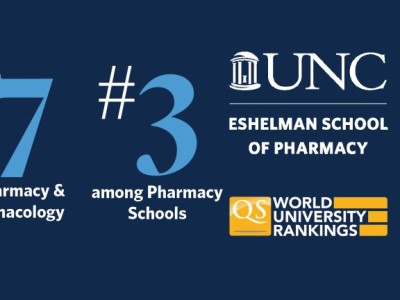December 8, 2021
 Inhaled drugs represent an important and effective mechanism of targeted drug delivery to the lung.
Inhaled drugs represent an important and effective mechanism of targeted drug delivery to the lung.
However, inhaled drugs are often an expensive therapeutic option for lung diseases such as lung infections, asthma, or chronic obstructive pulmonary disease, said Gauri Rao, Pharm.D., MS, assistant professor in the Division of Pharmacotherapy and Experimental Therapeutics at the UNC Eshelman School of Pharmacy.
“The development of generic equivalents to brand name inhaled drugs could reduce the financial burden on patients who use and depend on these medications,” Rao said. “But drug development is limited by the difficulties in assessing the drug exposure in the lung on airway epithelia, the primary target of inhaled agents.”
Although physiologically based pharmacokinetic (PBPK) mathematical models can serve as an alternative to direct measurement of a drug within airway epithelia, current models fail to account for the actions of drug transporters and metabolizing enzymes that may influence the effective concentrations of inhaled drugs.
Rao added that increased knowledge about the levels of drug transporters and metabolizing enzymes can help researchers develop enhanced PBPK models that can support more rapid development of generic versions of inhaled drugs.
Rao recently received a $850,000 U01 grant of three years from the Food and Drug Administration to study drug transporters and metabolizing enzymes present in the human airway epithelia to help address the gap in knowledge.
The project, titled, “A physiologically based pharmacokinetic model of human airway epithelia,” is a collaboration between the UNC Eshelman School of Pharmacy (Dr. Gauri Rao, Philip Smith, Ph.D., and Jacqueline (Bezençon) Tiley, PhD, and UNC School of Medicine (Chuck Esther, MD, Ph.D., and Martina Gentzsch, Ph.D.). The work brings together a team of experts on airway epithelial cell culture, quantitative proteomics, PBPK modeling, and PK testing of aerosolized drugs to systematically measure the protein levels of relevant drug transporters and metabolizing enzymes within human airway epithelia.
The team’s proposal also takes advantage of the robust Tissue Procurement and Cell Culture Core present at UNC-Chapel Hill that can provide researchers with primary human airway epithelial cells for culture representing a wide range of demographic factors and anatomic locations as well as in vivo tissue samples for testing.
“Our ultimate goal is to make inhaled treatments affordable and efficient for patients,” Gauri said.
Latest News

Developing new ways to treat heart attacks without surgery

School maintains No. 7 spot in QS World University Rankings


